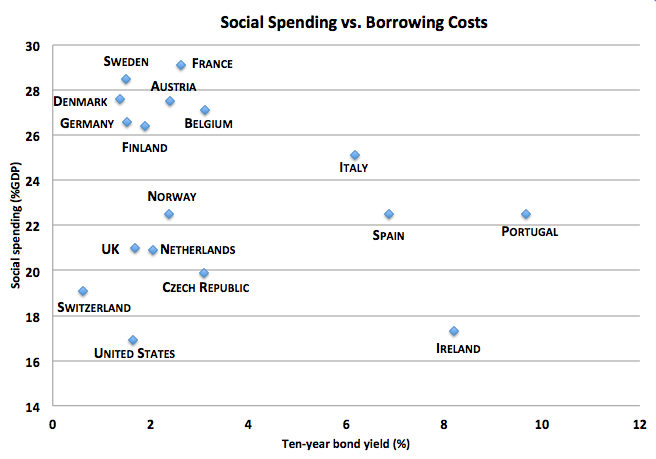SCOTUS upholds Obamacare .. and cunningly evades single payer .. or blesses Trojan Horse for Canadianizing US health system?
Jun 28th, 2012 | By Citizen X | Category: USA Today This morning’s announcement of the US Supreme Court decision, more or less upholding the constitutionality of so-called “Obamacare,” was a historic moment in the global village that begs some kind of comment. Even or perhaps especially up in the wild northern attic, where we already have a health care system that actually makes sense.
This morning’s announcement of the US Supreme Court decision, more or less upholding the constitutionality of so-called “Obamacare,” was a historic moment in the global village that begs some kind of comment. Even or perhaps especially up in the wild northern attic, where we already have a health care system that actually makes sense.
There apparently remain some ambiguities – about enforcement of both the individual insurance mandate, and state responsibilities for increased Medicaid coverage. (Thus: “The complexity of the ruling caused considerable confusion, with CNN and Fox News jumping the gun … and initially reporting the decision as a crushing defeat for the president.”)
That having been said, I was quite surprised myself to see the Court upholding the constitutionality of the law – albeit on federal taxing power but not commerce clause grounds. It was an even more welcome surprise that the 5-4 decision put the staunchly conservative Chief Justice Roberts on the side of so-called court liberals.
I’m happy enough to accept all the morning-again-in-America explanations for all this. The Chief Justice has shown some impressively high-minded instincts. On a somewhat more cynical other hand, however, he may have just been listening to the likes of Ben Nelson from Nebraska – the “the most conservative Democratic senator … who held out longest before voting for the Affordable Care Act.” Senator Nelson had been warning “that if the Supreme Court throws out the law, it’ll put the country on the road toward single-payer health care.” (I.e., the kind of sensible publicly funded system we already have in Canada.)
 If this is right, we will be able to continue to gloat (albeit in a somewhat unattractive way) that up here in the North American attic “Canadians pay much less per capita on health care than do Americans, while ranking higher among the most common measures of human health.”
If this is right, we will be able to continue to gloat (albeit in a somewhat unattractive way) that up here in the North American attic “Canadians pay much less per capita on health care than do Americans, while ranking higher among the most common measures of human health.”
At the same time again, Senator Nelson’s view has not gone unchallenged. Just this morning, on the Fox News site, the University of Maryland economist Peter Morici is arguing that : “The Supreme Court decision upholding the Affordable Health Care Act requirement that individuals purchase health insurance or pay a tax, as well as most other provisions regulating the health insurance market, may ultimately instigate a single payer system, akin to the British National Health Care Service.” (Canada in this case falls through the cracks, as it were – Professor Morici may agree with Al Capone: “I don’t even know what street Canada is on.”)
* * * *
 The grounds for Senator Nelson’s argument seem clear enough. As Professor Morici himself puts it: “the individual mandate was just a political deal between the Obama administration and insurance companies – the latter will get millions of new healthy policyholders and attendant profits–and it is much like other deals the president made to co-opt pharmaceutical manufacturers and health care providers and dragoon a bad law through Congress.”
The grounds for Senator Nelson’s argument seem clear enough. As Professor Morici himself puts it: “the individual mandate was just a political deal between the Obama administration and insurance companies – the latter will get millions of new healthy policyholders and attendant profits–and it is much like other deals the president made to co-opt pharmaceutical manufacturers and health care providers and dragoon a bad law through Congress.”
If this kind of insurance-company-free-market-friendly US health care deal actually is unconstitutional (along with the very similar state-level individual mandate put through by former Massachusetts Governor Mitt Romney, all his current protests aside), then what choice will the silent middle-class American majority who increasingly need some form of health-care relief finally have, but to support some form of the public “single payer” system that virtually every other “developed” democracy already has?
 From this angle, the great irony of Obamacare – and the passionate looney 19th or even 18th century right-wing resistance it has prompted – is that it is actually a public-private partnership compromise designed to avoid the logic of some otherwise inevitable fully public single-payer system. (And Chief Justice Roberts, unlike his fellow conservative tea-party fanatics – and as a few more or less actually predicted beforehand – has been smart and objective enough to appreciate this point, and act accordingly.)
From this angle, the great irony of Obamacare – and the passionate looney 19th or even 18th century right-wing resistance it has prompted – is that it is actually a public-private partnership compromise designed to avoid the logic of some otherwise inevitable fully public single-payer system. (And Chief Justice Roberts, unlike his fellow conservative tea-party fanatics – and as a few more or less actually predicted beforehand – has been smart and objective enough to appreciate this point, and act accordingly.)
Professor Morici’s argument, on the other hand again, is that any kind of movement towards trying to rationalize the imperfections of aggressive free-market health care, dominated by private insurance companies (and big corporate employers), just may prove a slippery slope towards a public, single payer system. (Which is why, if you like, virtually every other “developed” democracy in the world today already has such a thing.)
 More exactly (and in Professor Morici’s own words) : “ the ACA [ie Affordable Care Act] does not solve the broader affordability problem bedeviling business and middle class families facing rising premiums, co-pays and burdensome claims processes.” But what it tries to do in this direction “requires the Office of Personnel Management (OPM) to sponsor, through private firms, two health plans.” And “those public options will be advantaged by larger taxpayer contributions and exemptions from critical regulations imposed on private insurers.”
More exactly (and in Professor Morici’s own words) : “ the ACA [ie Affordable Care Act] does not solve the broader affordability problem bedeviling business and middle class families facing rising premiums, co-pays and burdensome claims processes.” But what it tries to do in this direction “requires the Office of Personnel Management (OPM) to sponsor, through private firms, two health plans.” And “those public options will be advantaged by larger taxpayer contributions and exemptions from critical regulations imposed on private insurers.”
In this setting, Professor Morici speculates: “Businesses will have a strong incentive to push employees into one of the two public plans or drop coverage altogether and pay the $2,000 penalty imposed by the ACA. Middle and upper income employees displaced from employer-based plans will likely find one of the ‘public options’ the least expensive and most sensible choice … All along, the OPM-sponsored plans were a Trojan Horse. They will be advantaged over private insurers even with the individual mandate helping pull down the latter’s costs per enrollee. With the ACA pushing health care costs ever higher, the artificial price advantage of government-sponsored insurance will be too big to resist.”
 I certainly do not understand the legislation at all well enough (or even at all, frankly) to judge whether these fears – or perhaps just prophecies – of Professor Morici’s make sense. But if they do, I think it will almost certainly be a good thing for the USA today. And those who worry that wildly radical right-wing American politicians like Paul Ryan may be right, when they claim such a development will just push the USA into the same kind of troubled public finance box that bedevils the likes of Portugal, Ireland, Spain, and Italy today, should take a look at the compelling graph of “Social Spending vs. Borrowing Costs” that has recently appeared on the Atlantic website (and is reproduced on this page too).
I certainly do not understand the legislation at all well enough (or even at all, frankly) to judge whether these fears – or perhaps just prophecies – of Professor Morici’s make sense. But if they do, I think it will almost certainly be a good thing for the USA today. And those who worry that wildly radical right-wing American politicians like Paul Ryan may be right, when they claim such a development will just push the USA into the same kind of troubled public finance box that bedevils the likes of Portugal, Ireland, Spain, and Italy today, should take a look at the compelling graph of “Social Spending vs. Borrowing Costs” that has recently appeared on the Atlantic website (and is reproduced on this page too).
The relevant Atlantic site article is headlined “The Myth That Entitlements Ruin Countries, Busted in 1 Little Graph.” It points out that fears about “wild government overspending – especially on entitlements” in southern Europe are being bandied about by Paul Ryan and others. They say that “absent drastic reform – read: cuts – to the social safety net, we’ll end up in penury like the Greeks” and the Portuguese and the Spaniards, etc, etc.
 The article goes on “It’s a scary story. But it’s just a scare story. Yes, we have a long-term healthcare spending problem. But that doesn’t make us Greece … The evidence – or lack thereof – is in the chart below [well actually immediately left in its incarnation on this website here]. It compares each country’s average social spending since 1999, via the OECD, against its current borrowing costs. See the pattern? There is none. Europe’s biggest social spenders don’t have any problems. And Europe’s biggest problem countries don’t spend that much on social programs. The death knell of the welfare state this is not.”
The article goes on “It’s a scary story. But it’s just a scare story. Yes, we have a long-term healthcare spending problem. But that doesn’t make us Greece … The evidence – or lack thereof – is in the chart below [well actually immediately left in its incarnation on this website here]. It compares each country’s average social spending since 1999, via the OECD, against its current borrowing costs. See the pattern? There is none. Europe’s biggest social spenders don’t have any problems. And Europe’s biggest problem countries don’t spend that much on social programs. The death knell of the welfare state this is not.”
(Oh and btw, in Canada of course we already have the kind of public single payer health care system that Professor Morici is prophesying about. Our North American province-run variation on the theme – with limited federal government involvement – is not quite like the “British National Health Care Service.” But it is probably a little more like what a US single payer system would look like in practice. And we also already have less of a “long-term healthcare spending problem” than our American brothers and sisters!)


Epic 🙂 I found your site on google poking around for something
completely unrelated, and now I’m gonna have to go through the old material! So much for spare time today, but this was a spectacular find!!!